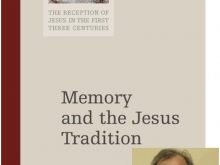Inadequacy of the Tools in the Search for the Historical Jesus
Continuing my reading of part 2 of Nanine Charbonnel’s Jésus-Christ, Sublime Figure de Papier . . . . . . o . . Legend? Tale? Novel? — If these labels can be applied to any of the Old Testament works they fail when we attempt to relate them to the New Testament narratives. The impasse … Continue reading “Inadequacy of the Tools in the Search for the Historical Jesus”
